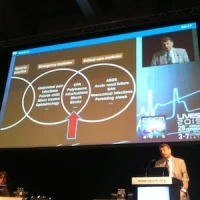While survival after ICU has improved, more needs to be known about health-related quality of life for the survivors.Lotti Orwelius, Sweden presented a study from the Swedish Intensive Care Registry on health-related quality of life at 2, 6 and 12 months after critical illness. Their study followed up over 4,900 patients and was presented at the European Society of Intensive Care Medicine congress in Berlin today.
Their analysis aimed to examine the trajectory of health-related quality of life at 2, 6 and 12 months after ICU discharge, to ascertain any diagnosis-specific patterns and relationship to survival. The study included a mixed ICU population who had spent 96 hours or more in the ICU. The Swedish Intensive Care Registry has recorded patient-recorded outcome measures including health-related quality of life since 2008.
Data from 50 general ICUs was analysed. They also eamined the impact of background variables and factors such as age, sex, duration of stay in ICU and SAPS III scores, and compared the results with age and sex matched general population.
The instrument used was Short Form 36, developed by John Ware. This includes questions on physical function, e.g. does your health limit you in climbing several flights of stairs? and on mental health e.g. have you felt calm and peaceful?
1,628 patients had follow up data for all 3 occasions. Health-related quality of life did improve over time, with the largest improvement between 2 and 6 months. Orwelius observed that there was selection bias, in that this group was only 7% of the ICU database. The patients followed up were older, had more severe illness, but fewer days on the ICU. Sepsis formed the largest diagnosis group. The data did not mention co-morbidities, and the study did not adjust to whether patients had pre-existing chronic illness or acute illness. It is the patients in the lowest quartile for health-related QOL who need early intervention, she said. Those in the highest quartile seem to do quite well on their own or with their family, and do not need so much support. Sweden is fortunate in that most ICUs have follow up clinics.
Claire Pillar
Managing editor, ICU Management
Their analysis aimed to examine the trajectory of health-related quality of life at 2, 6 and 12 months after ICU discharge, to ascertain any diagnosis-specific patterns and relationship to survival. The study included a mixed ICU population who had spent 96 hours or more in the ICU. The Swedish Intensive Care Registry has recorded patient-recorded outcome measures including health-related quality of life since 2008.
Data from 50 general ICUs was analysed. They also eamined the impact of background variables and factors such as age, sex, duration of stay in ICU and SAPS III scores, and compared the results with age and sex matched general population.
The instrument used was Short Form 36, developed by John Ware. This includes questions on physical function, e.g. does your health limit you in climbing several flights of stairs? and on mental health e.g. have you felt calm and peaceful?
1,628 patients had follow up data for all 3 occasions. Health-related quality of life did improve over time, with the largest improvement between 2 and 6 months. Orwelius observed that there was selection bias, in that this group was only 7% of the ICU database. The patients followed up were older, had more severe illness, but fewer days on the ICU. Sepsis formed the largest diagnosis group. The data did not mention co-morbidities, and the study did not adjust to whether patients had pre-existing chronic illness or acute illness. It is the patients in the lowest quartile for health-related QOL who need early intervention, she said. Those in the highest quartile seem to do quite well on their own or with their family, and do not need so much support. Sweden is fortunate in that most ICUs have follow up clinics.
Claire Pillar
Managing editor, ICU Management
Latest Articles
Quality of life, ICU, survivors
Follow up of ICU survivors in Sweden on health-related quality of life










